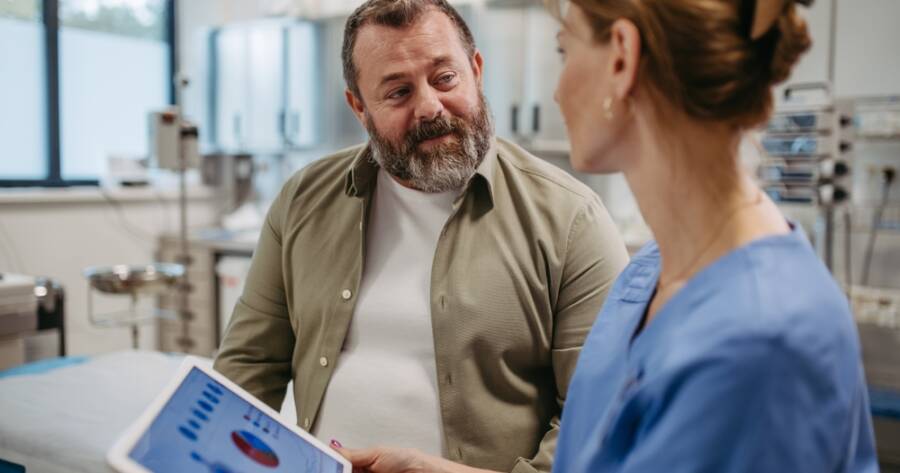A colonoscopy is a procedure where a doctor examines the inner lining of the colon and rectum using a flexible tube with a camera. It helps diagnose conditions, remove polyps or growths, and can prevent cancer by detecting abnormalities early. It’s vital for both diagnosis and treatment.
What Can a Colonoscopy Find?
A colonoscopy is a medical procedure that allows a doctor to examine the inside of the colon and rectum.1 It is used to diagnose and treat a variety of conditions, including colorectal cancer, polyps, and inflammatory bowel disease. During a colonoscopy, the doctor may find a number of different things, including:
- Colorectal cancer: Colorectal cancer is the third leading cause of cancer death in the United States. It is important to detect colorectal cancer early, when it is more likely to be curable. A colonoscopy can help to detect colorectal cancer by finding polyps, which are small growths that can develop into cancer.
- Polyps: Polyps are small growths that can develop on the inside of the colon or rectum. Most polyps are benign, but some can develop into cancer. A colonoscopy can help to remove polyps before they have a chance to become cancerous.
- Inflammatory Bowel Disease: Inflammatory bowel disease (IBD) is a group of conditions that cause inflammation of the digestive tract. IBD can cause a variety of symptoms, including abdominal pain, diarrhea, and weight loss. A colonoscopy can help to diagnose IBD by looking for inflammation and damage to the colon and rectum.
Common Findings During a Colonoscopy
In addition to the findings listed above, a colonoscopy may also reveal other problems, such as:
- Hemorrhoids: Hemorrhoids are swollen veins in the rectum. They can cause pain, bleeding, and itching. The doctor can recommend treatment for hemorrhoids if they are found during a colonoscopy.
- Fistulas: Fistulas are abnormal connections between two organs. Fistulas can cause pain, infection, and drainage.
- Strictures: Strictures are narrowing parts of the colon or rectum. They can cause constipation, pain, and bloating.
It’s important to communicate any unusual or persistent abdominal pain, discomfort, or changes in your gastrointestinal health with your doctor. These symptoms, while sometimes minor, can be indicators of underlying issues that warrant further investigation. Many of the conditions mentioned earlier, such as polyps or inflammation, are not uncommon and can often be detected early through proper screening and open dialogue with your healthcare provider.
When Should You Discuss With Your Doctor?
Knowing when to get a colonoscopy is important for maintaining your digestive health and detecting early potential issues. Generally, it is recommended that individuals at average risk for colon cancer begin routine colonoscopies at age 45.2 However, this recommendation may vary based on your personal and family medical history. If you have a family history of colorectal cancer or polyps, you may need to start screening earlier and more frequently. Additionally, those with certain conditions, such as inflammatory bowel disease, require earlier and more regular screenings.
It’s also important to consider a colonoscopy if you experience symptoms such as unexplained abdominal pain, persistent changes in bowel habits, rectal bleeding, or unexplained weight loss. These symptoms could indicate underlying issues that a colonoscopy can help diagnose.
Ultimately, the decision on when to get a colonoscopy should be made in consultation with your healthcare provider, who can assess your individual risk factors and recommend an appropriate screening schedule. Regular colonoscopies are a key part of preventive health care, offering the best chance for early detection and successful treatment of colon-related conditions.
Learn More About Colonoscopy Findings
If you are thinking about undergoing a colonoscopy, it’s essential to have a detailed conversation with your doctor about what to expect before, during, and after the procedure. Your doctor can provide you with personalized information, address any concerns you might have, and guide you through the preparation process to ensure that everything goes smoothly. In addition to consulting with your healthcare provider, you can also educate yourself further by visiting reputable sources. These resources offer comprehensive information on colonoscopy findings, the importance of early detection, and how this procedure can play a vital role in maintaining your overall health. Being well-informed can help you feel more comfortable and confident as you take steps to protect your digestive health.




